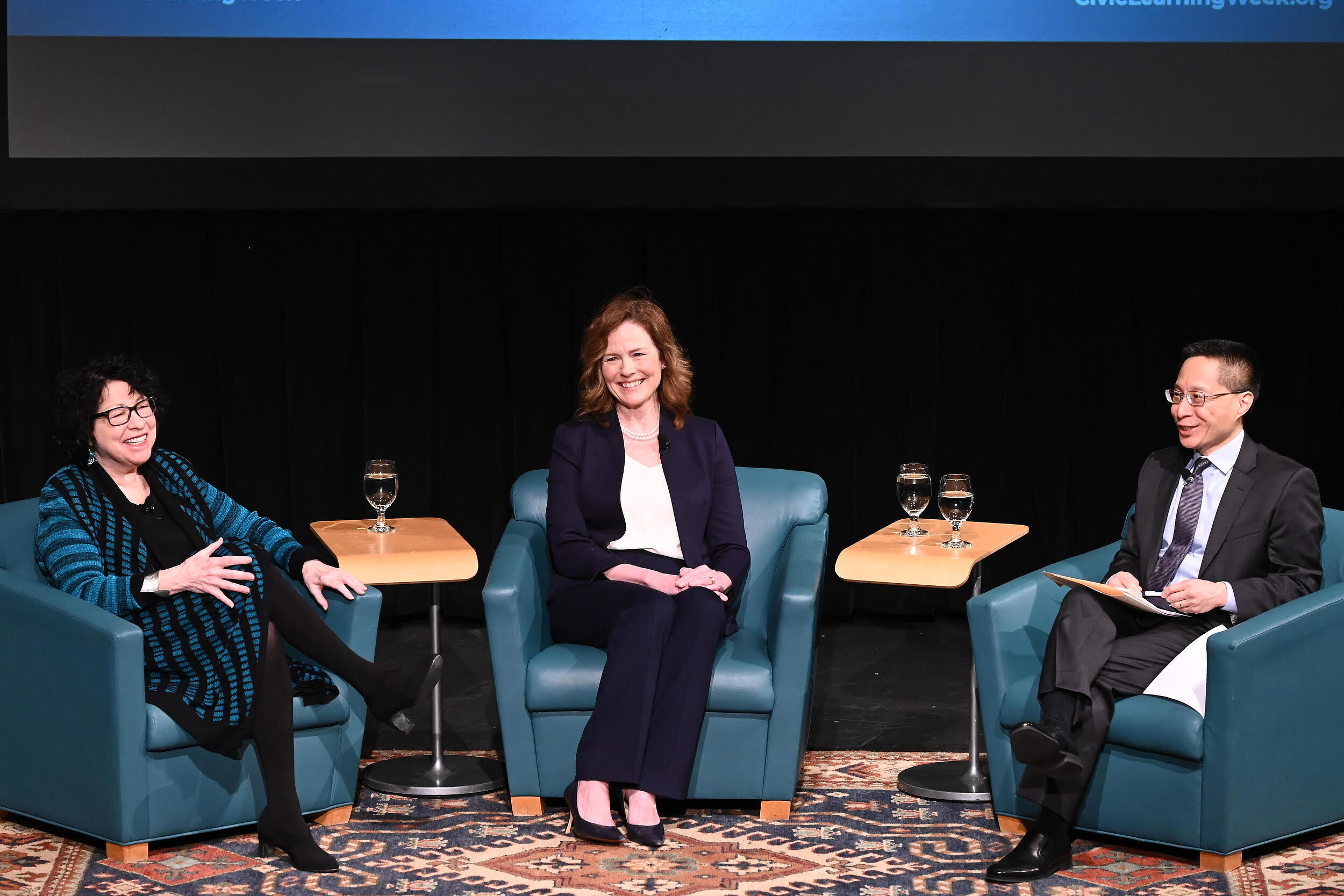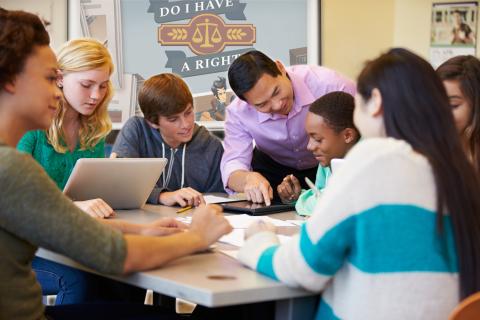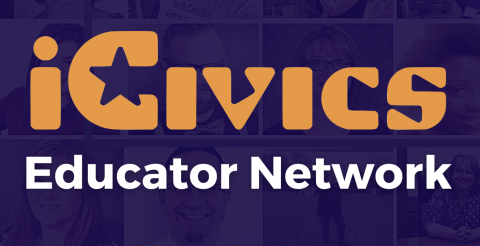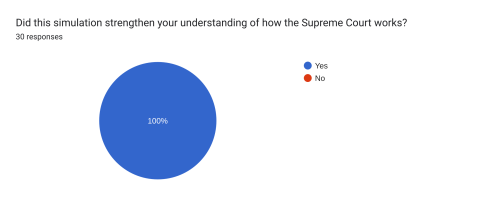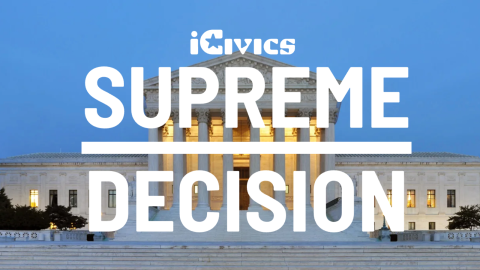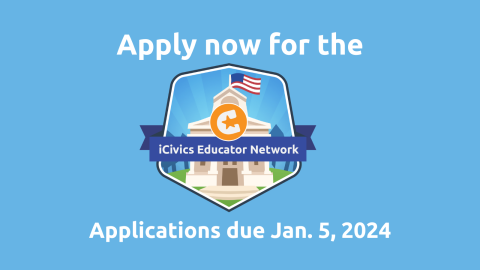“I love iCivics! My kids love to play Win the White House!”
“Awesome! Have you ever used any of the other resources from iCivics? They go great with the games!”
“No, tell me more!”
I had this conversation multiple times with educators I met last fall at the annual National Council for the Social Studies Conference while I was helping out in the Exhibit Hall at the iCivics booth. I teach at Maranacook Community High School in Readfield, Maine, a rural community next to Maranacook Lake just outside the Maine State Capitol. I use iCivics in a variety of ways in AP U.S. History and non-level U.S. History. This Spring, I have a student intern working with me from the University of Maine at Farmington named Tom Tubman. In an effort to promote iCivics beyond the games, I thought it would be interesting to document our use of an iCivics DBQuest in our classes titled “Woman Suffrage and World War I.”
As I said earlier, it seems many educators are familiar with the amazing learning games on the iCivics website, with Win the White House often being the one everyone knows. What seems to be lesser known are the lesson plans and activities iCivics also offers. These resources include connections to state standards and how they can fit into scope and sequence. They also show how they connect to the games iCivics hosts on their site.
I selected this DBQuest because it fits well within the curriculum for content in US History and includes other important aspects such as multiple viewpoints, primary source analysis, argument analysis, sourcing, and inquiry. Most of my students currently in my U.S. history classes have played the iCivics game Cast Your Vote, and so this DBQuest connects well to this game in getting students reflecting on a time when some of them would not have been able to cast their ballots.
My student teacher, Tom, and I took a team-teaching approach to this, each leading a different part of the lesson. Tom led the discussion using the timeline and I facilitated the document analysis. We closed the lesson with an extension video that added context and gave them a sense of how suffrage came to pass.

Our first class was at the end of the day on a Friday! We started with a question to engage students and get their brains working, “What is suffrage?” A brief discussion revealed that most students had heard of this term in conjunction with voting and had a sense of its meaning. As this is a U.S. History course, students had learned previously about the early days of the women’s rights movement, including the work of Elizabeth Cady Stanton and others at Seneca Falls in drafting the “Declaration of Sentiments” and Susan B. Anthony. This historical context is important in getting the most out of this DBQuest to help students draw conclusions about the timeline and the accompanying Primary Source documents. Upon reflection, Tom concluded that historical context was important to this activity. Information about the early days of the push for women’s rights and women’s suffrage going back to Seneca Falls would greatly help students understand that women were fighting for a voice long before the First World War. Ensuring students have this context is important in having a deeper understanding of the agency of women in bringing about Suffrage.
Students received the student handout on paper and went to work highlighting in different colors, events that helped women’s suffrage make progress, and events that worked against Women’s Suffrage. The ensuing discussion elicited several insights from students, such as events may in fact be well-intended and essentially good even if, from the perspective of the Women’s Suffrage movement, the event worked against their progress.
Students worked individually to complete the “Math Moment” and “Reflection,” placing the events from the First World War, and we then had a class discussion around their thoughts about why it took so long for women’s suffrage to pass. This activity revealed many interesting insights including the quotes below.
“The major shifts of WWI, including women proving themselves capable of fully taking charge of duties left behind by men… “
“… because misogyny had been a part of western culture for a long time…”
“… (post-Civil War/Reconstruction) Civil Rights proved more of a pressing issue and women were seemingly unimportant to the government…”
“Because the society of most nations and cultures of the time were built around strict gender roles…”
“The fight for Black suffrage was also occurring at the time and that may have caused more focus on that rather than woman’s suffrage.”
“I think a lot of people in power, men, didn’t see it as an issue and didn’t care…”
The next part of the lesson required students to examine three different types of primary source documents from the era. In the first class, we had students in small groups of 3-4 analyze all 3 documents and draw conclusions. We made a modification in the second class that turned this into more of a jigsaw activity where we had students in 3 groups to start and together they analyzed one document. Then we mixed them into groups so at least 1 student from each of those 3 groups was in the new groupings. Then they took turns sharing out their document and their analysis. We found this produced more discussion between the students and likely gave them more confidence in completing the final section of the handout titled “Argument On!” In this section, students document their analysis and conclusions about the documents. They locate key arguments quoted from the documents and identify where they came from and whether the argument was intended to “inform,” “persuade,” or “inflame”. At the end of this, they discussed the 2 questions at the end: Which wartime argument to promote suffrage appeals to you more? Why? And: Does the way in which the message is communicated affect your decision? (Ex: picket vs. political cartoon vs. leaflet). This was followed by a class discussion on these questions. Students have some interesting responses, some examples are included below.
“The leaflet argument for war… this played on democratic/freedom built pride for America”
“Cartoons are eye-catching and quick to look at, but they can also be thought provoking to the reader.”
“Leaflet… it also has the best view on how women are important to society…”
“…the Article was just informing while the Leaflet was trying to start something…”
“The most convincing argument for me was the rational approaches of the statements that if women can serve the country they should be able to vote in the country’s politics.”

We finally turned to the video we selected to close out the lesson. The video, produced by the History Channel is titled “The 19th Amendment.” We gave students the following questions for discussion that went with the short video.
- What were the two approaches taken to get Women’s Suffrage passed?
- What happened at the Women’s Suffrage Parade before Wilson’s inauguration in 1913?
- What happened to Alice Paul?
- What was Wilson’s argument for Women’s Suffrage?
We didn’t have a lot of time for discussion after the video, but we did briefly talk about the different strategies, how Alice Paul and other women suffered, and how the 19th Amendment came down to needing Tennessee’s vote to pass—and how it seemed doomed to failure by one vote until Harry T. Byrne changed his vote at the last minute thanks to a letter from his Mother! Many students expressed amazement and these “Hollywood-like” details!
In the end, we found this DBQuest to be engaging and thought-provoking! It promoted historical thinking skills such as primary source analysis, cause and effect, and change and continuity over time. Additionally, it connected well to civics by getting students to reflect on the importance of voting and the lengths people will go to in order to secure their rights, as well as the various modes available to persuade, inform, or inflame others about one’s cause. Students came away with an understanding of civil rights, discrimination, and changing attitudes around these issues. We thoroughly enjoy the iCivics games and the lessons they support, but it’s awesome that they also have supplemental lessons like this DBQuest! Give it a try!
Written by Shane Gower
Shane Gower is passionate about ideas! He considers himself fortunate to have a career as a teacher that allows him to explore his passion as he has done for the past 25 years. He was the 2016 Gilder-Lehrman Maine State History Teacher of the Year and currently teaches AP US History, AP Psychology, Ethics, and History through Film. These courses are all dual enrollment through the nearby Thomas College. In addition to the classroom, he is also Past-President of the Maine Council for the Social Studies and a Retro Report Teacher Ambassador.
Through the iCivics Educator Network, the perspectives of teachers across the country contribute to the public conversation about civic education in the United States. Each contributor represents their own opinion. We welcome this diversity of perspectives.




